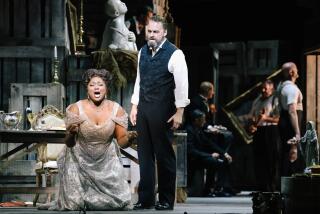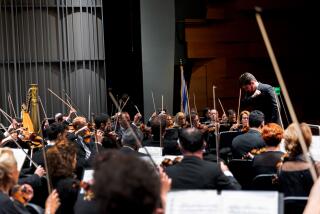Bolshoi Opera Stars Savor New Power
- Share via
SAN FRANCISCO — “You’ll excuse me, if I don’t get up,” explained the 64-year-old Soviet mezzo-soprano Irina Arkhipova, as she extended her hand and remained ensconced on the sofa in the light-filled sun porch of a private home in the Bay Area. Arkhipova and her husband, 50-year-old tenor Vladislav Piavko, had just arrived in the United States for a series of concerts, climaxing in an appearance in Los Angeles at the Wilshire Ebell Theatre on Sunday.
Arkhipova, who is a political figure as artistic consultant to the Bolshoi Opera and president of the All Soviet Musical Union, was delighted at the new air of freedom sweeping the Soviet Union. “The important thing,” Arkhipova explained through an interpreter, “is that now you can say what you think. This was not possible before.”
Artists in the union are getting more power, she said, when before they had to do what the Ministry of Culture told them what to do. “For example, when I wanted to sing ‘La Favorita’ at La Scala with Luciano Pavarotti, who had asked me to do it with him, I didn’t get the chance because it was vetoed by the ministry.”
Here at the invitation of Beyond War, a worldwide peace group, the couple is on a tour of six cities.
Arkhipova’s rich voice has dominated the Bolshoi stage for 35 years, first as Carmen, then Amneris in “Aida,” Princess Eboli in “Don Carlos,” and Azucena in “Il Trovatore.”
Piavko, a dramatic tenor, has sung with the Bolshoi since 1965. He first sang Don Jose in Bizet’s “Carmen” in 1970 and that set him on the road that today reaches to Verdi’s Otello and Puccini’s Claaf.
“I did not start as a dramatic tenor,” he said. “I made my debut as Pinkerton in ‘Madama Butterfly.’ But even then there were the seeds of my later career.
A long career at the top takes some managing, but Arkhipova disavowed any concern for special handling.
“It all came naturally for me. Gradually I added more and more roles and it just happened. Of course, I had had a fine training and that helped. What my teachers had insisted upon most was that I learn to sing easily, without stress or strain. You must learn not to tense up your throat muscles, but to relax, always to relax, and let your voice flow out simply and easily, like a mountain stream.”
More to Read
The biggest entertainment stories
Get our big stories about Hollywood, film, television, music, arts, culture and more right in your inbox as soon as they publish.
You may occasionally receive promotional content from the Los Angeles Times.










